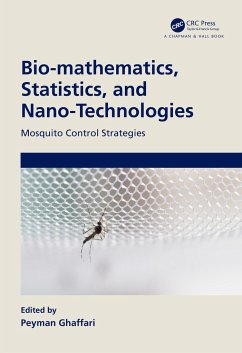Bio-mathematics, Statistics, and Nano-Technologies
Mosquito Control Strategies
Herausgeber: Ghaffari, Peyman
Bio-mathematics, Statistics, and Nano-Technologies
Mosquito Control Strategies
Herausgeber: Ghaffari, Peyman
- Gebundenes Buch
- Merkliste
- Auf die Merkliste
- Bewerten Bewerten
- Teilen
- Produkt teilen
- Produkterinnerung
- Produkterinnerung
This book brings together experts from a large array of disciplines in order to provide a comprehensive overview of cutting-edge techniques to model, analyse and combat mosquito-transmitted vector-borne diseases.
Andere Kunden interessierten sich auch für
![Nano-Physics and Bio-Electronics Nano-Physics and Bio-Electronics]() T. ChakrabortyNano-Physics and Bio-Electronics146,99 €
T. ChakrabortyNano-Physics and Bio-Electronics146,99 €![Micro and Nano Energy Harvesting Technologies Micro and Nano Energy Harvesting Technologies]() Chengkuo LeeMicro and Nano Energy Harvesting Technologies173,99 €
Chengkuo LeeMicro and Nano Energy Harvesting Technologies173,99 €![Innovative Bio-Based Technologies for Environmental Remediation Innovative Bio-Based Technologies for Environmental Remediation]() Innovative Bio-Based Technologies for Environmental Remediation143,99 €
Innovative Bio-Based Technologies for Environmental Remediation143,99 €![Omics Technologies and Bio-Engineering Omics Technologies and Bio-Engineering]() Omics Technologies and Bio-Engineering103,99 €
Omics Technologies and Bio-Engineering103,99 €![Internet of Nano-Things and Wireless Body Area Networks (WBAN) Internet of Nano-Things and Wireless Body Area Networks (WBAN)]() Fadi Al-TurjmanInternet of Nano-Things and Wireless Body Area Networks (WBAN)64,99 €
Fadi Al-TurjmanInternet of Nano-Things and Wireless Body Area Networks (WBAN)64,99 €![R Graphics, Third Edition R Graphics, Third Edition]() Paul MurrellR Graphics, Third Edition56,99 €
Paul MurrellR Graphics, Third Edition56,99 €![Sustainable Summer Fodder Sustainable Summer Fodder]() Sustainable Summer Fodder56,99 €
Sustainable Summer Fodder56,99 €-
-
-
This book brings together experts from a large array of disciplines in order to provide a comprehensive overview of cutting-edge techniques to model, analyse and combat mosquito-transmitted vector-borne diseases.
Produktdetails
- Produktdetails
- Verlag: Taylor & Francis Ltd
- Seitenzahl: 338
- Erscheinungstermin: 2. August 2023
- Englisch
- Abmessung: 256mm x 185mm x 25mm
- Gewicht: 946g
- ISBN-13: 9780367477004
- ISBN-10: 0367477009
- Artikelnr.: 67516967
- Verlag: Taylor & Francis Ltd
- Seitenzahl: 338
- Erscheinungstermin: 2. August 2023
- Englisch
- Abmessung: 256mm x 185mm x 25mm
- Gewicht: 946g
- ISBN-13: 9780367477004
- ISBN-10: 0367477009
- Artikelnr.: 67516967
Dr Peyman Ghaffari received his Ph.D. in Mathematical-Physics (Non-linear Dynamics and Complex Systems) at Imperial College (London) 1997. He also received his M.S. (German Diploma in Physics) 1993 in Theoretical Plasma Physics at University of Düsseldorf (Germany). After completing his PhD at Imperial College, he worked as an industrial consultant in Germany and UAE for 12 years focusing on establishing Joint-Ventures between International companies wanting to penetrate the Middle Eastern and European markets. In 2006 Dr. Ghaffari returned to academia as a visiting/associate scientist at Imperial College, parallel to his consultancy. In 2007 he co-founded the "Complexity and Interdisciplinary Research Centre (CIRC)" at Imperial College providing a platform to transmit the ideas of "Complexity Research" into Industry. Since March 2010 until Dec 2018, he has worked at the University of Lisbon in the Biomathematics and Statistics Group and has participated in several scientific projects resulting in associated scientific articles. Since 2020 he is continuing his research as an associate researcher at CIDMA (University of Aveiro). In June 2017 he won the prestigious EU- COST Grant (CA16227) as proposal writer (estimates for 4 years ca. 700.000 Euro). Since Sept. 2017 he has been the Chair of this Action (www.imaac.eu) with around 100 members in around 35 countries involved. He also founded a yearly Training School ("International Training School on Optimal Control Theory and Mosquito Control Strategies") in 2018 and a yearly conference in 2019 on Political Decision Making and Vector-Borne Diseases aiming to bring political decision makers and scientists together. Dr. Ghaffari is working now on application of Optimal Control Theory on deterministic and stochastic epidemiological models. Other scientific interests include Complex Systems, Self-Organization, Fractional Derivatives, Neuronal Networks and Industrial Mathematics.
1. Introduction and Overview. Section I. Control of Mosquitoes and Their
World: An Overview. 2. Practical Control Methods and New Techniques for
Mosquito Control. 3. Concepts of the Best Management Practices for
Integrated Pest, Mosquito, and Vector Management. 4. Overview of Personal
Protection Measures Through the Innovative Use of Repellent-Textiles. 5.
Biology, Surveillance and Control of Mosquito Vectors. Section II.
Mathematical Modelling Immunity: An Overview based on Malaria. 6. Models of
Acquired Immunity to Malaria: A Review. Section III. Mathematical
Epidemiology including Mosquito Dynamics and Control Theory. 7.
Multi-strain Host-vector Dengue Modelling: Dynamics and Control. 8.
Mathematical Models and Optimal Control in Mosquito Transmitted Diseases.
Section IV. Topological Studies: Topology Meets Mosquito Control. 9. On The
Shape and Design of Mosquito Abatement Districts. Section V. Chemometric
and Mathematical Approach for Modelling and Designing Mosquito Repellents.
10. A Multiplatform Chemometric Approach to Molecular and Mathematical
Modeling of Mosquito Repellents. Section VI. Pharmacy Meets Mosquito
Control: Using Pharmacological Tools Combating Mosquito Transmitted VBDs.
11. Pharmacological Approach to Combat Mosquito Transmitted Malaria.
Section VII. Using Natural Oils Combatting Mosquitos: An Overview. 12.
Plant based Repellents: Green Mosquito Control. 13. Micrcencapsulation of
Essential Oils for Antimicrobial Function and Mosquito Repellency. Section
VIII. Textiles and Paints as Mosquito Control Tools. 14. Mosquito Repellent
against Anopheles SPP. and Aedes Aegypti on Cotton Fabric. 15. Silica-Based
Organic-Inorganic Hybrid Treatments as Anti-Mosquito Textile Finishing. 16.
Cotton and Polyester Fabrics Plasma Coated with Hydrogenated Amorphous
Carbon Films. Section IX. Testing Methods for Treated Textiles with
Mosquito-Repellents: An Overview. 17. Testing Methods for
Mosquito-Repellent Treated Textiles. Section X. Case Studies: Putting the
Knowledge into Action. 18. A Case Study: How the Rephaiah Project Combats
Malaria in Young Children. 19. Strengthening the control of mosquito
vectors in Cabo Verde; New Approaches to Improve Intervention Strategies.
World: An Overview. 2. Practical Control Methods and New Techniques for
Mosquito Control. 3. Concepts of the Best Management Practices for
Integrated Pest, Mosquito, and Vector Management. 4. Overview of Personal
Protection Measures Through the Innovative Use of Repellent-Textiles. 5.
Biology, Surveillance and Control of Mosquito Vectors. Section II.
Mathematical Modelling Immunity: An Overview based on Malaria. 6. Models of
Acquired Immunity to Malaria: A Review. Section III. Mathematical
Epidemiology including Mosquito Dynamics and Control Theory. 7.
Multi-strain Host-vector Dengue Modelling: Dynamics and Control. 8.
Mathematical Models and Optimal Control in Mosquito Transmitted Diseases.
Section IV. Topological Studies: Topology Meets Mosquito Control. 9. On The
Shape and Design of Mosquito Abatement Districts. Section V. Chemometric
and Mathematical Approach for Modelling and Designing Mosquito Repellents.
10. A Multiplatform Chemometric Approach to Molecular and Mathematical
Modeling of Mosquito Repellents. Section VI. Pharmacy Meets Mosquito
Control: Using Pharmacological Tools Combating Mosquito Transmitted VBDs.
11. Pharmacological Approach to Combat Mosquito Transmitted Malaria.
Section VII. Using Natural Oils Combatting Mosquitos: An Overview. 12.
Plant based Repellents: Green Mosquito Control. 13. Micrcencapsulation of
Essential Oils for Antimicrobial Function and Mosquito Repellency. Section
VIII. Textiles and Paints as Mosquito Control Tools. 14. Mosquito Repellent
against Anopheles SPP. and Aedes Aegypti on Cotton Fabric. 15. Silica-Based
Organic-Inorganic Hybrid Treatments as Anti-Mosquito Textile Finishing. 16.
Cotton and Polyester Fabrics Plasma Coated with Hydrogenated Amorphous
Carbon Films. Section IX. Testing Methods for Treated Textiles with
Mosquito-Repellents: An Overview. 17. Testing Methods for
Mosquito-Repellent Treated Textiles. Section X. Case Studies: Putting the
Knowledge into Action. 18. A Case Study: How the Rephaiah Project Combats
Malaria in Young Children. 19. Strengthening the control of mosquito
vectors in Cabo Verde; New Approaches to Improve Intervention Strategies.
1. Introduction and Overview. Section I. Control of Mosquitoes and Their
World: An Overview. 2. Practical Control Methods and New Techniques for
Mosquito Control. 3. Concepts of the Best Management Practices for
Integrated Pest, Mosquito, and Vector Management. 4. Overview of Personal
Protection Measures Through the Innovative Use of Repellent-Textiles. 5.
Biology, Surveillance and Control of Mosquito Vectors. Section II.
Mathematical Modelling Immunity: An Overview based on Malaria. 6. Models of
Acquired Immunity to Malaria: A Review. Section III. Mathematical
Epidemiology including Mosquito Dynamics and Control Theory. 7.
Multi-strain Host-vector Dengue Modelling: Dynamics and Control. 8.
Mathematical Models and Optimal Control in Mosquito Transmitted Diseases.
Section IV. Topological Studies: Topology Meets Mosquito Control. 9. On The
Shape and Design of Mosquito Abatement Districts. Section V. Chemometric
and Mathematical Approach for Modelling and Designing Mosquito Repellents.
10. A Multiplatform Chemometric Approach to Molecular and Mathematical
Modeling of Mosquito Repellents. Section VI. Pharmacy Meets Mosquito
Control: Using Pharmacological Tools Combating Mosquito Transmitted VBDs.
11. Pharmacological Approach to Combat Mosquito Transmitted Malaria.
Section VII. Using Natural Oils Combatting Mosquitos: An Overview. 12.
Plant based Repellents: Green Mosquito Control. 13. Micrcencapsulation of
Essential Oils for Antimicrobial Function and Mosquito Repellency. Section
VIII. Textiles and Paints as Mosquito Control Tools. 14. Mosquito Repellent
against Anopheles SPP. and Aedes Aegypti on Cotton Fabric. 15. Silica-Based
Organic-Inorganic Hybrid Treatments as Anti-Mosquito Textile Finishing. 16.
Cotton and Polyester Fabrics Plasma Coated with Hydrogenated Amorphous
Carbon Films. Section IX. Testing Methods for Treated Textiles with
Mosquito-Repellents: An Overview. 17. Testing Methods for
Mosquito-Repellent Treated Textiles. Section X. Case Studies: Putting the
Knowledge into Action. 18. A Case Study: How the Rephaiah Project Combats
Malaria in Young Children. 19. Strengthening the control of mosquito
vectors in Cabo Verde; New Approaches to Improve Intervention Strategies.
World: An Overview. 2. Practical Control Methods and New Techniques for
Mosquito Control. 3. Concepts of the Best Management Practices for
Integrated Pest, Mosquito, and Vector Management. 4. Overview of Personal
Protection Measures Through the Innovative Use of Repellent-Textiles. 5.
Biology, Surveillance and Control of Mosquito Vectors. Section II.
Mathematical Modelling Immunity: An Overview based on Malaria. 6. Models of
Acquired Immunity to Malaria: A Review. Section III. Mathematical
Epidemiology including Mosquito Dynamics and Control Theory. 7.
Multi-strain Host-vector Dengue Modelling: Dynamics and Control. 8.
Mathematical Models and Optimal Control in Mosquito Transmitted Diseases.
Section IV. Topological Studies: Topology Meets Mosquito Control. 9. On The
Shape and Design of Mosquito Abatement Districts. Section V. Chemometric
and Mathematical Approach for Modelling and Designing Mosquito Repellents.
10. A Multiplatform Chemometric Approach to Molecular and Mathematical
Modeling of Mosquito Repellents. Section VI. Pharmacy Meets Mosquito
Control: Using Pharmacological Tools Combating Mosquito Transmitted VBDs.
11. Pharmacological Approach to Combat Mosquito Transmitted Malaria.
Section VII. Using Natural Oils Combatting Mosquitos: An Overview. 12.
Plant based Repellents: Green Mosquito Control. 13. Micrcencapsulation of
Essential Oils for Antimicrobial Function and Mosquito Repellency. Section
VIII. Textiles and Paints as Mosquito Control Tools. 14. Mosquito Repellent
against Anopheles SPP. and Aedes Aegypti on Cotton Fabric. 15. Silica-Based
Organic-Inorganic Hybrid Treatments as Anti-Mosquito Textile Finishing. 16.
Cotton and Polyester Fabrics Plasma Coated with Hydrogenated Amorphous
Carbon Films. Section IX. Testing Methods for Treated Textiles with
Mosquito-Repellents: An Overview. 17. Testing Methods for
Mosquito-Repellent Treated Textiles. Section X. Case Studies: Putting the
Knowledge into Action. 18. A Case Study: How the Rephaiah Project Combats
Malaria in Young Children. 19. Strengthening the control of mosquito
vectors in Cabo Verde; New Approaches to Improve Intervention Strategies.








